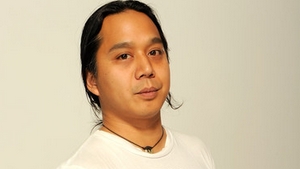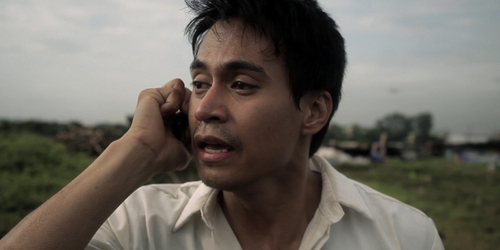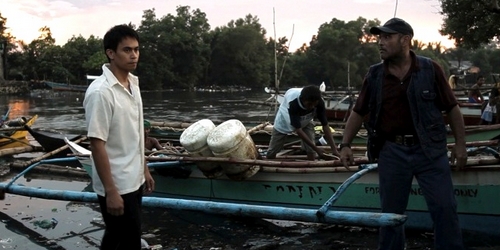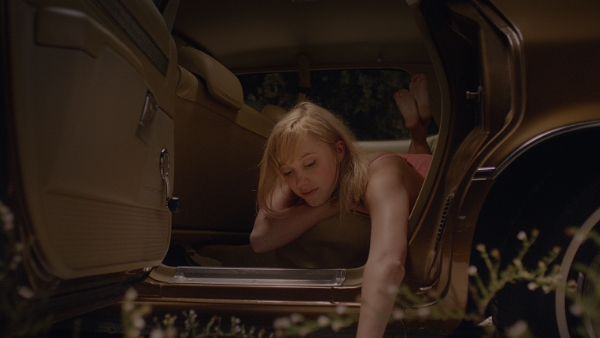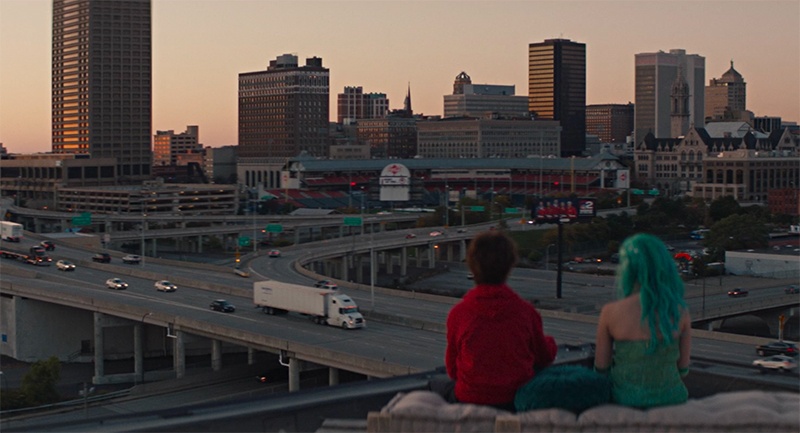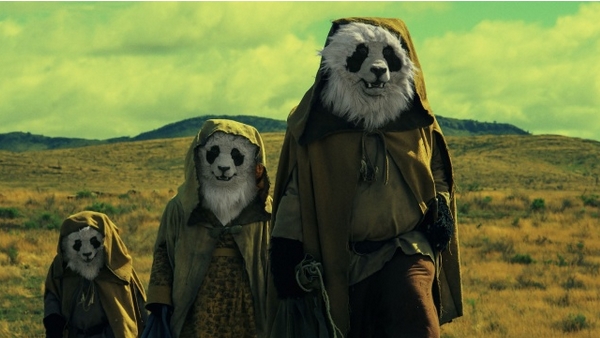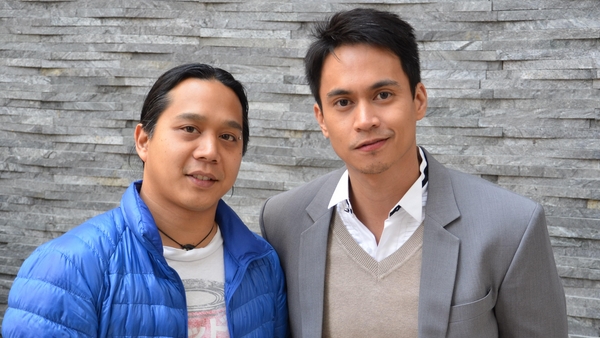 Writer/director Ron Morales’ Graceland is a gripping and all-too-real feeling story of a kidnapping gone wrong. Ron’s work is very limited but his sophomore feature Graceland is so well-crafted and engaging you’d think he’d culled this from a lifetime of working in the film business. Before making his debut film Santa Mesa (with Melissa Leo) Ron had been working in the industry (in the camera/electrical department and as a key grip) for about 13 years and it’s likely he’s picked up a more than a few things watching/working on high profile films like Spider-Man 3, Michael Clayton and The Departed.
Writer/director Ron Morales’ Graceland is a gripping and all-too-real feeling story of a kidnapping gone wrong. Ron’s work is very limited but his sophomore feature Graceland is so well-crafted and engaging you’d think he’d culled this from a lifetime of working in the film business. Before making his debut film Santa Mesa (with Melissa Leo) Ron had been working in the industry (in the camera/electrical department and as a key grip) for about 13 years and it’s likely he’s picked up a more than a few things watching/working on high profile films like Spider-Man 3, Michael Clayton and The Departed.
His passion project Graceland, shot entirely in his home country of the Philippines, is a brief but impacting story that takes us so deep into the messy Filipino underworld that the 84 minutes feels like a lifetime. Further it’s one that, like the main character Marlon (Arnold Reyes), we want to escape from as quickly as possible. In our interview with Ron we learned that his main goal for the story to raise awareness to the atrocities that happen in the Philippines nearly everyday. Here are the highlights from our time with this writer/director who is already making quite a name for himself with his sophomore film.
————————————————————————————————————————————————————————–
Ron before we get into Graceland can you tell us about your background, your previous work Santa Mesa and how it led up to this film?
Santa Mesa was my first film. That was done in 2008 and starred Melissa Leo and Jaime Tirelli and it was my first journey to shooting back home. I feel like that American who wants to go back and discover his roots and Graceland is part of that too, this catharsis. As far as my background I’ve been working in the industry for about 13 years as a lighting technician and have been lucky to have gotten in that early on right after college and worked on some major motion pictures. I went to school for Photography at Parsons and went to NYU for Film after that. But all my life I’ve been involved within the arts whether it was music, painting or sculpture and so on and then it gradually went to film.
So being in the industry, did it help you get a leg up when working on Santa Mesa and Graceland?
Yeah it does help you in terms of getting your work to people who will be able to help you. In Santa Mesa we ended up getting Melissa Leo and so working with that caliber of talent is pretty lucky. You also get to utilize your connections.
Let’s talk about Graceland, where the idea came from, the length of time crafting it, etc.
Graceland was a beast actually to write. One of the first stepping stones for the script was when I was in the Philippines visiting my cousins
and I was in the car and we got pulled over be a cop and I just happened to be reading a newspaper on a recent kidnapping and that’s when 2 and 2 came together and I thought, “what if something horribly went wrong in this scenario?”. That was the catalyst for Graceland and from there I kept going back to the Philippines, doing a little more research on kidnapping for ransom and I submitted it to Tribeca All Access and got shortlisted in 2008. After that I scrapped the project for a while and started working on another screenplay, much more of an art house piece, having to do with sex workers in the Philippines and ex-patriots but I couldn’t find funding for that.
So then in 2010 my friend Sam Rodger, who I went to NYU with, teamed up with producer Rebecca Lundgren and I after reading the script. He was like, “We gotta do this. This is a great little piece and we can actually do it”. Then we all put together our friends and family and raised a little money and I ended up utilizing that research from the other trip and put it into Graceland. That made it socially relevant in and to the Philippines.
There are a lot of kidnapping movies out there but this came across very original and it has a lot to do with the pace. You slowed everything way down so it’s not about wire taps and police, it’s about a father looking for his daughter with very little means. You made it very layered , intricate and personal and that made it feel very real. Also based on what you said, getting your inspiration from a newspaper article events like this do happen.
It does happen. In the past decade the Philippines has been known for kidnapping for ransom. It has died down quite a bit. But in terms of the story itself I really wanted to make something both commercially watchable, in terms of pacing but what I learned as an American filmmaker but also put in all those bits and pieces of the Philippines and how I see it every time I go back home. Recently we screened it theatrically in the Philippines and the response was great.
A lot of people say it is a very dark film, which it is, but most of the viewers thanked us and said it showed the Philippines in a way we don’t ever want to see it. A lot of their stuff is about escapism, like we have here, but they were really proud that we brought this story back home.
This reminds me a lot of Akira Kurosawa films in that there are no good guys or bad guys; it’s just people doing what the need to survive and it’s fascinating to see the motivations that Marlon (Arnold Reyes) had. You think on the surface it’s a straight up kidnapping movie but reveals more layers, credit a lot of that to yourself, but can you talk about the character development and were you happy with how it came together?
I really enjoyed how it developed when I was working with the actors especially Marlon’s character and how he had to hide so much from the family. The screenplay started to unfold as I was constantly rewriting it while we were shooting just because we lost locations and lost a couple actors so we had a lot to rewrite *laughs* so the last scene where Ramos is talking to the Congressman about the young girl, I rewrote that scene 2 days before we shot and was changed very much from how we had it planned all along. But that’s the benefit of a low-budget film, you can take risks like that.
Also what I think helped Graceland come together as far as character development were the actors. The really dove into the roles and flushed out what could have been stereotypical carbon copies of typical archetypes. But moral dilemmas and decay of their characters, etc., I think we can all find that within ourselves as we watch it and that’s what makes it a little bit more real. That and the fact of the way we shot it helped too. It’s just so in your face because the camera angles we chose were just 6 to 10 inches away from the actors and so we were right there with them. No make up and the locations we chose, like actual working brothels, adds to the grittiness making it very visceral.
Viewing this an American it may surprise people that this doesn’t have an adrenaline fueled ending that we’re used to seeing. What you did was create something so scaled back that is showed us a much larger story/picture. It’s also brilliant because it ends in uncertainty. Marlon has come this far but now he’s not sure what will happen next. Will he succeed or has everything been for naught?
Well I’m glad you brought that up because I wanted it to end that way. It makes him question all his moral downfall; everything that he gave up for family. There’s a couple articles I read in the Philippines about organ traffickers who recruit locally within poverty and in less fortunate communities. People are selling their kidneys to buy a TV living in these shanty homes no bigger than this little room we’re in [one of the Highball’s karaoke rooms in Austin, TX] and then 2 weeks later they die of infection.
So it’s like these choices are made over there out of necessity and I think it rings true to Filipino psyche as well as other societies. That is the essence I want to portray in Marlon’s character and I don’t think there should be a clear ending in Graceland. I think that’s the beauty of the story because everyone is morally compromised or is going to compromise someone else who has affected them and that’s true to life everywhere.
What I’m curious about now is how different audiences, specifically different countries, view this film. Additionally how does censorship play in? In one scene Marlon goes to an underage service bar with the Congressman that audiences in America probably don’t know about and won’t be prepared for what they’ll see.
I didn’t want to dumb down what actually happens in some of those clubs. The power of the scene is that it’s uncomfortable. It’s not the nudity in those scenes that make you cringe, it’s what one of the girls says, so dryly and removed. It’s more of how she says her one line but the nudity just adds to it. As far as censorship I actually had to censor it for the commercial screening in the Philippines but it still carried its weight and its power and to me it’s just because of her line. But so far we haven’t got any negative response about it and I think that’s because this story isn’t exploiting its people, it’s actually making people aware.
What do you think you’ve learned going from Santa Mesa to Graceland and moving forward?
I’ve learned to take more risks. Santa Mesa is very mild and a coming-of-age story. This is the polar opposite. I really wanted to take the risk and challenge myself as a writer and a director with touchier material and heavier subject matter and try to push the envelope a little bit more with some of these scenes. Even in the Philippines people make films about corruption or prostitution but still nothing taboo, so what I wanted to do was take something taboo and twist it into something this is commercial that would entertain you but also carry that weight of the social message.
Additionally the learning curve was huge on this film because I had less resources and less money. We made the best film we can and I think that goes back to my roots in the Philippines; trying to make something out of nothing and that’s exactly what we did. We had that mentality going in there and we took it all the way to the end.
———————————————————————————————————————————————————————————–
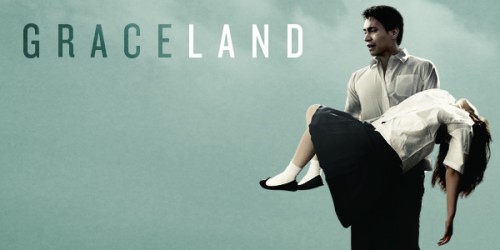
Thanks to Ron Morales for his time and for the Alamo Drafthouse and Drafthouse Films for arranging this interview. Graceland is now available on VOD and will begin its theatrical run starting April 26th, 2013.
